by Heather Kent | Apr 20, 2023
One of the tenants of the 4-H program is the opportunity for youth to showcase what they have learned. Sometimes this occurs during the county fair or a contest. But youth also have the opportunity to showcase their knowledge and skills during county and district events. This competitive opportunity is the culminating experience of a 4-H project. County and District events are typically held in the spring and qualify for state demonstrations, illustrated talks, public speaking, and share the fun (talent) acts. While participation is optional, this program was designed to give youth a safe space to practice life and leadership skills and receive recognition for all their hard work during the 4-H year. Together, this helps build youths’ self-confidence and poise. If you are new to 4-H, or not familiar with county and district events, this article will provide an overview, as well as some resources to help prepare!
What are County/District Events?
County and District events are an opportunity for youth to showcase what they have learned about their project and practice communication skills. Of all the life skills we teach in 4-H, communication is probably one of the top skills that can benefit youth regardless of what career path they choose. During this event, youth have the opportunity to showcase their skills and knowledge through a variety of contests which include: prepared public speaking, demonstrations (show and tell presentations), illustrated talks (speeches with visual aids), graphic design, photography, and talent show.
What Skills Do Youth Learn Through This Program?
County and District events are an opportunity for youth to learn how to communicate with others. It also helps them work towards a standard. Judges provide positive feedback about their presentation and suggestions for improvement. This helps youth build poise and confidence when speaking in front of groups. Youth who receive a red or blue quality ribbon at County Events have the opportunity to proceed to District events and compete with youth from surrounding counties. Agents and volunteers can work with the youth between competitions to polish their presentations, but the overall topic/theme should remain the same. Senior youth (ages 14-18) who receive a red or blue quality ribbon at District events can proceed to the state competition which takes place during 4-H University.
Why Should My Child Get Involved?
County and District 4-H Events provide a safe space for youth to learn and provide a positive competition experience. While not everyone gets a trophy, youth compete against themselves- that means they are judged against a standard and earn a ribbon based on the standard score. They also receive constructive feedback on how to improve.
What Resources Are Available to Help My Club/Child?
Most county extension programs offer a workshop to help youth prepare their presentations. You can find more information in our 4-H Events and Activities Handbook. We also have previous blog posts with links to the criteria, judging sheets, and training videos. If you are interested in more opportunities like this for your child, OR if you are willing to serve as a judge for competitive events, contact your local UF/IFAS Extension Office.
by Allison Leo | Nov 29, 2021
4-H Day at the North Florida Fair celebrated a triumphant return on Saturday November 13. This annual event in Tallahassee took a hiatus in 2020 due to the pandemic but returned in full force this past Saturday. 4-H Day at the Fair is an event that connects 4-H members and their families with each other from across North Florida. The fair was filled with a sea of green as eager 4-H members joined together to compete in 4-H contests, enjoy fair rides, and sample delicious fair food. The North Florida Fair provides 4-H members and volunteers with special deals on rides for the day. 4-H Member Arvaneh G. shared that her favorite part was “all the rides, especially the Himalaya, and the bounce houses”.
Before the rides and fair are open, 4-H Day Starts in the early morning as members compete in a variety of contests. This year, those contests were the STEM Challenge, Consumer Choices, Agriculture Judging, Horticulture Identification, and Wildlife Ecology. Members put their life skills developed through 4-H to work by displaying critical thinking, teamwork, and problem solving during the contests. A total of 116 youth competed in the contests during 4-H Day at the North Florida Fair this year. Participants had the option to compete as individuals or on a team in each contest. Senior 4-H Member Sophia L. shared “it was really great to see the Wildlife Ecology Contest return, we had such a great turn out with a lot of variety in ages”. Sophia expressed how she was excited for the contest to be back, adding “there is something about that friendly competition atmosphere this is really motivating, seeing so many people that are all passionate about similar things”.
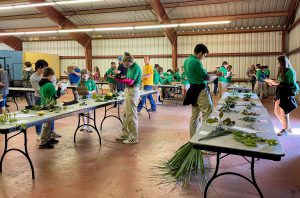
4-H members participating in the Horticulture ID Contest
STEM Contest
The topic of the STEM Challenge Contest this year involved building a roller coaster using the engineer design process. All youth competing in this contest were placed on a team based on their age division. A limited amount of materials were provided and the teams worked together to create a roller coaster that would carry a marble from the top of the coaster to the bottom with at least two loops and one curve. The teams were judged on creativity, communication, and teamwork. The final designs were put on display in the 4-H Building for the remainder of the fair.
Consumer Choices
The Consumer Choices Contest measured the ability of youth to be smart shoppers. The item categories this year were cell phone plans, ground transportation selection, wireless portable speakers, and smoothies. 4-H members had the opportunity to compete in this contest as an individual or on a team. Each individual or team was provided with a “situation card”. Based on the criteria provided in the card, members were asked to review four different choices of each item and rank them from best to worst based on the criteria. After they were finished ranking, they would have to justify their selection through an “oral reasoning” section.
Agriculture Judging
During the Agriculture Judging Contest, individuals and teams were tested on their knowledge of beef, poultry, hay, corn, soybean, and oats. Youth competed both as individuals and on teams with their age division. Agriculture judging consists of analyzing a product (i.e. cattle, soybeans) and measuring it against a standard. Members were asked to analyze four different choices of each item and rank them from best to worst based on the standard.
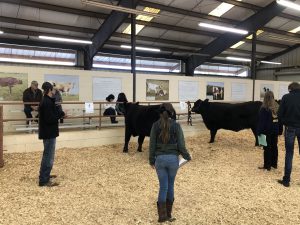
4-H members competing in the Agriculture Judging Contest
Horticulture Identification
The Horticulture Identification Contest tested the ability of members to identify over 60 horticulture specimens. The items were divided into four separate categories. Those categories were ornamentals, fruits & vegetables, flowers, and foliage. The specimens were laid out on tables, each bearing a number that corresponds to a scoresheet, that listed over 100 plant names. This contest replicates the state 4-H Horticulture Contest held each year in June.
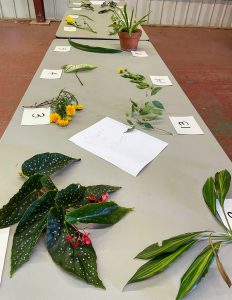
Plant specimens in the Horticulture ID Contest
Wildlife Ecology Contest
During the Wildlife Ecology Contest, members were tested on their knowledge of Florida trees, mammals, birds, reptiles, and amphibians. They identified the various items through pictures, physical specimens, and audio sounds. 4-H Member Joycelyn G. joined 4-H this past year and had the opportunity to participate in two contests this year. When asked what her favorite thing about 4-H Day at the Fair was, she answered “I loved the rides and I loved the competition. Thank you very much for having a special spot for me. I really loved the fair. It was the best day ever!”
4-H Exhibits & Club Booth Building
In addition to contests, members had the opportunity to view exhibits and club booths in the 4-H Building at the fair. 4-H members from across the panhandle submit exhibits that express what they have learned through their 4-H experience. Premiums and special merit awards are issued to members whose exhibits demonstrate outstanding efforts and quality in each class. Club booths are constructed by club members and volunteers. The club booths showcase the various 4-H clubs in North Florida.
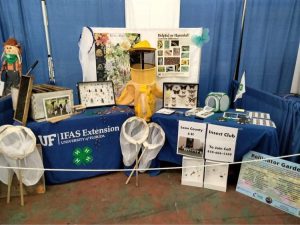
Leon County 4-H Insect Club created their booth to highlight the importance of pollinators
by pmdavis | Nov 5, 2021
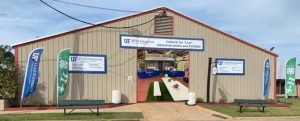
UF/IFAS Building at the NFF
The 79th Annual North Florida Fair began with exhibits coming in Monday and being judged on Wednesday. We would love you to come see what our industrious youth have been up to creating artwork, growing plants and sewing to create some one of a kind pieces. Thank you to our judges who volunteered their time to support our youth!
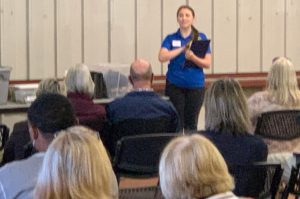
Allison orienting judges for the 4-H exhibit judging.
The 4-H experience is being showcase right now at the 2021 North Florida Fair in Tallahassee, Florida. The fair is open thru November 14th, we hope you will come by and visit us. Here you will have the opportunity to see the 4-H youth work and meet UF/IFAS Extension Faculty and Staff. There are two areas to visit with Extension professionals.
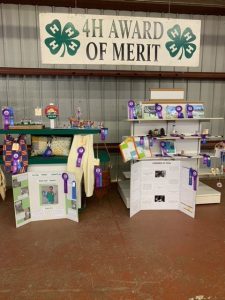
2021 Award of Merit Exhibits on Display at NFF
The first is the 4-H Building. In this exhibit you will find youth exhibits of artwork, sewing, canning, photography and much more. The second is the UF/IFAS Building where you can check out your marine science knowledge, learn about grains and grasses and amphibians. Youth will be participating in Beef, dairy, goat, poultry, and rabbit shows throughout the week. 4-H Day at the Fair is Saturday, November 13, 2021. From 10:00 a.m. – 12:00 Noon youth will be competing in agricultural judging, horticultural judging, wildlife ecology, consumer choices, stem challenge, sewing contests to demonstrate what they have learned about these specific topics.
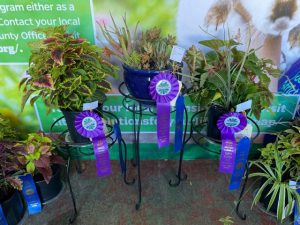
The top Award of Merit winners for plants from all three age divisions
4-H teaches youth responsibility, compassion, respect and the value of hard work. It helps youth become a confident kid and caring adult. We provide 4-H programs in every county in Florida. 4-H programs are offered in big cities, small towns, and rural communities, as well as on U.S. military installations. For more information contact your local extension office. Participation shall not be denied on the basis of race, color, religion, sex, national origin, disability, sexual orientation, marital or family status, or political beliefs. Persons with disabilities should contact the Extension Office at least 10 working days prior to the event so that proper consideration can be given to the request.
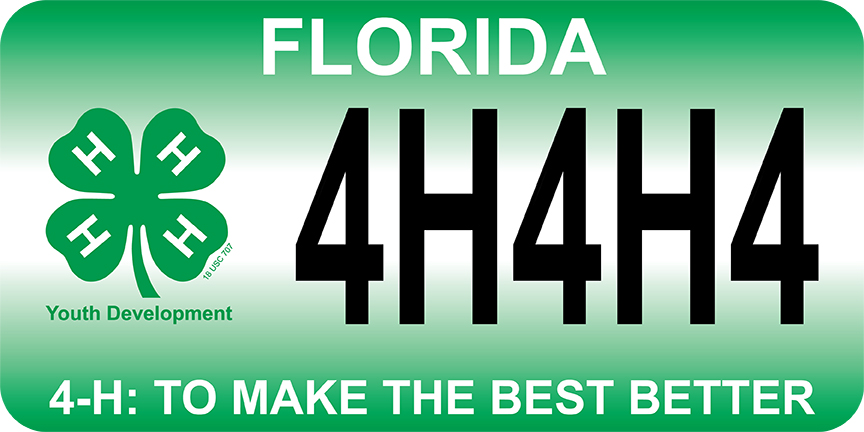
Help support by purchasing a 4-H Specialty Plate
You can help kids have the same great experience – share your #4HGrown story. You can also help your local 4-H program by purchasing a 4-H license plate. Vouchers for a new specialty license plate bearing the iconic 4-H clover is available for purchase at all county tax collector offices and license plate agencies in Florida or online (from anywhere in Florida) through the Escambia County Tax Collector’s Office. The license plate will go into production once 3,000 pre-sale vouchers are sold. The voucher, which includes the $25 specialty plate fee plus processing fees, is $33 total. Please consider purchasing your plate today, it would make a great Holiday present for those who grew up in 4-H!

by aschortinghouse | Jul 14, 2021
Did you know the Florida 4-H Horse Program offers horse shows, horse judging, Hippology, public speaking, demonstrations, illustrated talks, quiz bowl, horsemanship schools, and even scholarships?
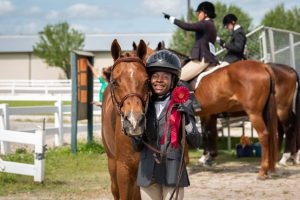
Youth at the 2019 Area North Horse Show in Clay County, FL on May 11, 2019.
September 1, 2021 starts the new 4-H year, and now is the time to get involved! The Florida 4-H Horse Program consists of all the programs mentioned above, and only a few of those events actually requires owning a horse. The horse program has something for everyone, and the best part is that you get involved with youth focused, horse loving community. Below, we will introduce you to each part of the program, but if you have more questions, be sure to reach out to your county agent. For this article, we will look at programs where you do not need to own or lease a horse, and programs where you do. So let’s get started!
Horseless Programs (No horse needs to be owned or leased)
Horse Judging
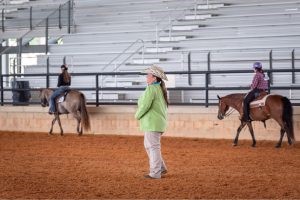
Youth compete at the 2019 Area North Horse Show in Clay County, FL on May 11, 2019
About: In horse judging, youth are presented classes of horses, and they are asked to evaluate each class, place them, and present oral reasons. This competition teaches youth to look at horses and evaluate the based on both confirmation and function. To watch a short video outlining the details of the competition, click here.
Important Dates:
February 2022: Florida State Fairy Horse Judging Contest, Tampa, Florida
March/Early April 2022: State 4-H and FFA Horse Judging Contest, Gainesville, Florida
For More information, please visit the UF 4-H Horse Judging Website.
Quiz Bowl
About: Quiz bowl is a trivia style contest with both individual and team components. Topics range from practical hands on knowledge to horse industry knowledge. To learn more about these events, watch a short video here.
Important Dates:
June 1, 2022 (not yet officially announced, but same as years past) – State Entry Deadline
June 2022- State 4-H Horse Quiz Bowl Contest, Gainesville, Florida
For More information, please visit the State 4-H Horse Demonstrations and Public Speaking.
Hippology
About: Hippology includes all aspects of horse knowledge and covers topics ranging from judging to feedstuffs identification. Hippology includes practical horse management knowledge combining it with the experience and knowledge from all the other contests (Judging, quiz bowl, public speaking, etc.). To watch a short video outlining the details of the competition, click here.
Important Dates:
March/Early April 2022 (not yet officially announced, but same as years past): State 4-H Contest, Gainesville, Florida
For More information, please visit the UF 4-H Hippology Website.
Public Speaking/Demonstrations/and Illustrated Talks
About: In these events, youth get to explore an area of interest as it relates to horses, then create a presentation to share it with others. These events have a county, district, and in some cases a state level. To learn more about these events, watch a short video here.
Important Dates:
Most counties have a qualification process, that differs across the state. Check with your county agent for the specifics on the county and district qualifying events.
June 1, 2022 (not yet officially announced, but same as years past) – State Entry Deadline
June 2022- State 4-H Horse Demonstrations and Public Speaking Contest, Gainesville, Florida
For More information, please visit the State 4-H Horse Demonstrations and Public Speaking site.
Scholarships
About: The Florida 4-H Horse scholarship program aims to reward youth who are demonstrated an intense passion and advancement in the Florida 4-H Horse Program. These scholarships have their own specific requirements and awards. For More information, please visit the Florida 4-H Equine Scholarships Summary here.
To watch a short video outlining the details of the opportunities, click here.
Important Dates:
June 1, 2022 (not yet officially announced, but same as years past) – Scholarship Applications are due
*Be sure to work closely with your county 4-H agent to ensure this process goes smoothly.
Project Horse Programs (A horse must be owned/leased by youth)
Area and State Horse Shows
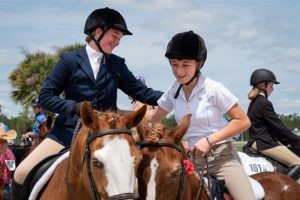
Photo Credit: Julie Andrews Photography Youth at the 2019 Area North Horse Show in Clay County, FL on May 11, 2019.
About: Each year, Florida 4-H hosts Area Shows to qualify for the State 4-H Horse Show. To learn more about these shows watch this short video which introduces the Florida 4-H Horse Shows.
Important Dates and Information:
If you want to compete at your Area Horse Show, you need to be aware of the following items:
- December 31, 2021- The Florida 4-H Horse Certification Form should be submitted to the county 4-H on or before December 31, 2021 to qualify to pa
Youth displaying ribbon after placing in a horse show class at the 2022 Area North Horse Show.
rticipate in the Area North Horse Show and the State 4-H Horse show. This form must be completed each year, even if you are using the same horse as a previous year. A youth should do this for each horse they intend to show or use to participate in 4-H shows with.
-
- Find the form here: Florida 4-H Horse Certification Form
- December 31, 2021- A Horse Lease Form should be completed and submitted if a youth wants to participate with a horse that is not owned by the youth. Even if you are borrowing the horse without a fee, youth must have a Horse Lease Form on file with the local county 4-H office.
- Find the form here: Horse Lease Form
- The Florida 4-H Horse Project Record Book is a great way to track and demonstrate your growth throughout the year.
- Find the project book here: Florida 4-H Horse Project Book
Each county has their own specific guidelines and requirements. Please be sure to check when your county offices are closed for the holidays as they may not be open on the final day the form is due. Contact your county office if you have any questions or concerns regarding county specific requirements. For more information about Florida 4-H Horse Project opportunities visit the State 4-H Horse Events site.
Horsemanship Schools
About: Horsemanship school is a week long program geared at teaching and equipping youth with the knowledge and tools needed to be successful and grow as horseman. There are three program offerings: Western week, English week, and Cowboy Camp (male 4-H youth). To watch a short video outlining the details of the opportunities, click here.
Important Dates:
Youth at Horsemanship School in Niceville, Florida before camps were moved to Gainesville.
Summer 2022 – Cowboy Camp, Gainesville, Florida
Summer 2022 – Western Week, Gainesville, Florida
Summer 2022 – English Week, Gainesville, Florida
For more information, please visit the UF Horsemanship School website.
The Florida 4-H Horse program is abounding in opportunities, so come join our community of horse loving youth and adults focused on “making the best, better”!
If you have any questions or concerns, please feel free to reach out to us!
You can find your local county 4-H office here.
*Photo Credits belong to:
Julie Andrews Photography, 2019 Area North Horse Show, Clay County, Florida.
*All Photos were taken prior to COVID-19 lockdown and policies.
by Allison Leo | Dec 30, 2020
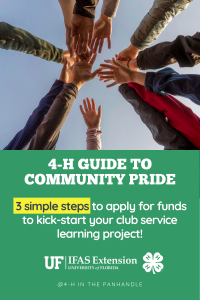 4-H clubs and individual members of all ages are eligible to participate in a Community Pride Project. This project is a great way to directly impact your community through a special service learning project of your choice. Service learning is an experiential learning activity and you can read more about what service learning is here or here.
4-H clubs and individual members of all ages are eligible to participate in a Community Pride Project. This project is a great way to directly impact your community through a special service learning project of your choice. Service learning is an experiential learning activity and you can read more about what service learning is here or here.
Community Pride is a service learning program. The objectives of the Community Pride Program are:
- Youth learn about their community and the impact the community has on their lives.
- Youth understand how to relate to their community as individuals and through group cooperation so they can effectively work in community activities, programs, and organizations.
- Youth develop skills and knowledge in community leadership.
- Youth gain experience carrying out community projects to improve their environment.
- Youth develop an interest in and love for their community.
How Does Community Pride Work?
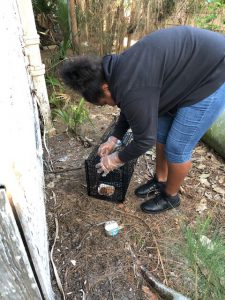
4-H member in Martin County sets up a trap for feral cats as part of the Community Pride Project Photo by: Natalie Parkell
During the project a community issue is identified, a service project is selected, a plan is implemented by the group, and reflection and reporting take place.
What types of projects can you complete through the Community Pride Grant?
That is up to you! The best thing about the project is that you get to select your service learning project based on you community’s need. There are five main steps to the Community Pride Project and those are listed in detail below. Martin County 4-H members received a Community Pride Grant to help combat feral cats in their neighborhood and you can read more about it here. Broward County 4-H members have completed a variety of projects through this program and you can see the variety of projects here. If you would like to receive a Community Pride Grant to complete a service project of your choice, follow the steps below and contact your county 4-H Agent for assistance.
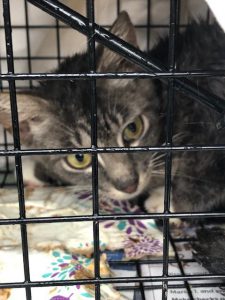
One of the cats that was captured, neutered, and released as part of Martin County 4-H’s Community Pride Project combating feral cats. Photo by: Natalie Parkell
Step 1: Community Needs Assessment
A Needs Assessment might sound intimidating and complicated, but it is a very simple step. Think of a needs assessment as a brainstorming session with the club members. They will share their input from their personal experiences in the community to figure out what project should be selected. It is important for this part to be youth-led because you want to select a project that has a community need and an interest from the youth. During the brainstorming session you will also come up with potential solutions to the problem.
Step 2: Creating a Project Plan
The next step is to create a project plan based on the ideas that were generated during the brainstorming session. Youth will select a solution that they can work towards and this solution will be the project. It is important to consider what steps will need to be completed to make the solution a reality (i.e. supply needs, work days, locating community partners, and more).
Step 3: Submit a Project Proposal
Your next step is to submit a proposal. All 4-H groups (or individual members) who would like to participate in this program must submit a proposal for funding of their Community Pride Project. Proposals accepted from the county must be emailed to 4hcontests@ifas.ufl.edu at the State 4-H Headquarters by the January 11, 2021 deadline date to be considered for the current 4-H years funding. Groups that are awarded funding will be notified via email in February with further instructions on your n
Step 4: Implement your Project
Now for the fun part! This is where you get to put your project plan into action and complete your community project. You will create your own timeline and schedule for the project and it will need to be completed between February through May 2021.
Step 5: Evaluate and Report
After your project is complete, it is time for you to reflect on all your hard work. During this time you will also evaluate the project and submit an official report to the state office by June 1, 2021. The state 4-H Office will conduct judging of all the completed projects during the first week of June. Participants in the Top Five Projects will be invited to a recognition breakfast!
2021 Community Pride Grant Important Dates:
- January 11th, 2021 – Project Proposals Due
- February 2021 – Grant Monies Disbursed
- February to May 2021 – Project Implementation
- June 1st, 2021 – Project Reports Due
Looking for COVID-19 “friendly” Service Project Ideas? Check out this earlier post for suggestions!
















